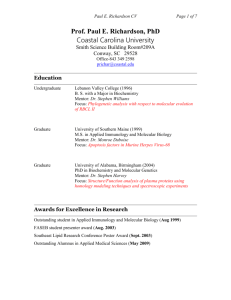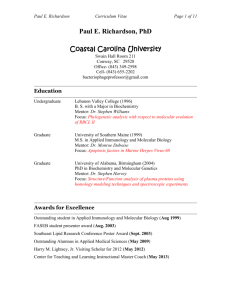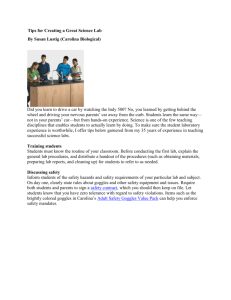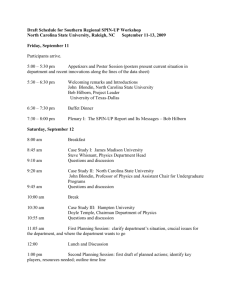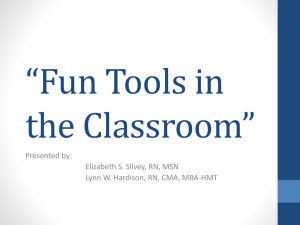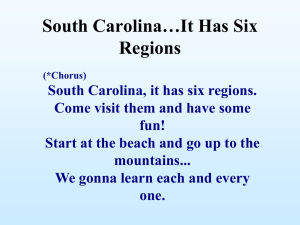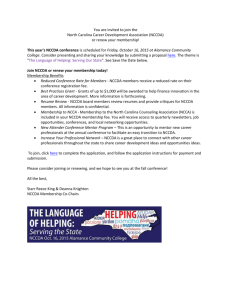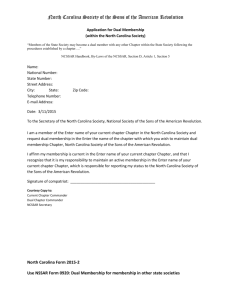Structural model for ApoB-22: insights regarding initiation of lipid
advertisement
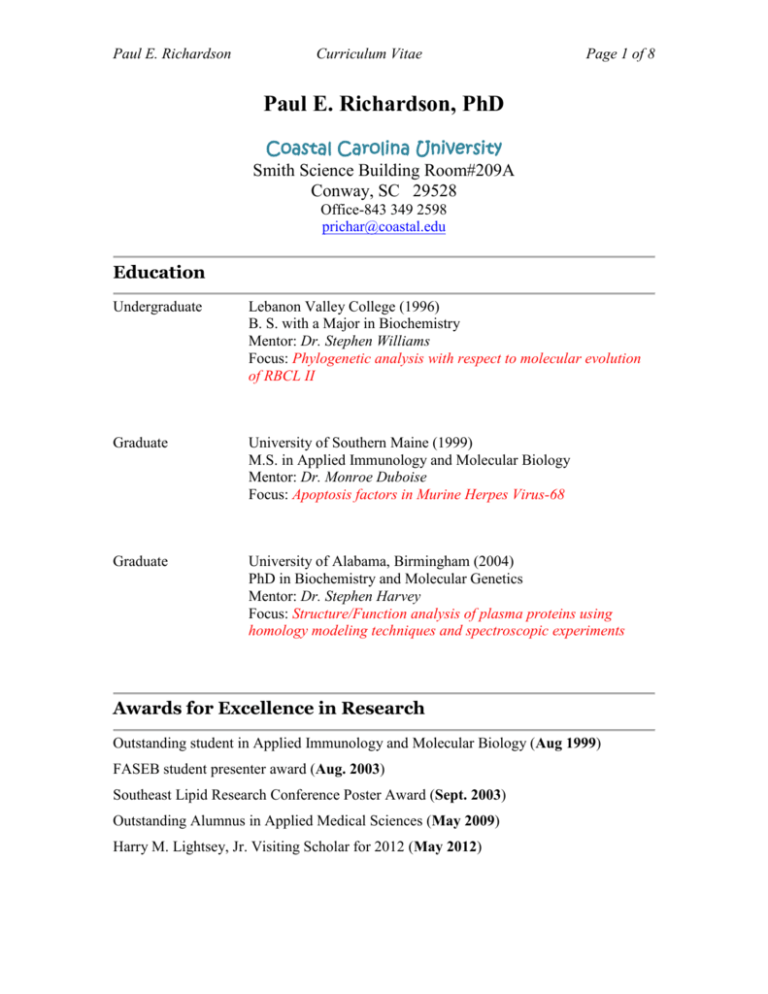
Paul E. Richardson Curriculum Vitae Page 1 of 8 Paul E. Richardson, PhD Coastal Carolina University Smith Science Building Room#209A Conway, SC 29528 Office-843 349 2598 prichar@coastal.edu Education Undergraduate Lebanon Valley College (1996) B. S. with a Major in Biochemistry Mentor: Dr. Stephen Williams Focus: Phylogenetic analysis with respect to molecular evolution of RBCL II Graduate University of Southern Maine (1999) M.S. in Applied Immunology and Molecular Biology Mentor: Dr. Monroe Duboise Focus: Apoptosis factors in Murine Herpes Virus-68 Graduate University of Alabama, Birmingham (2004) PhD in Biochemistry and Molecular Genetics Mentor: Dr. Stephen Harvey Focus: Structure/Function analysis of plasma proteins using homology modeling techniques and spectroscopic experiments Awards for Excellence in Research Outstanding student in Applied Immunology and Molecular Biology (Aug 1999) FASEB student presenter award (Aug. 2003) Southeast Lipid Research Conference Poster Award (Sept. 2003) Outstanding Alumnus in Applied Medical Sciences (May 2009) Harry M. Lightsey, Jr. Visiting Scholar for 2012 (May 2012) Paul E. Richardson Curriculum Vitae Page 2 of 8 Journal Articles Flood C, Gustafsson M, Richardson PE, Harvey SC, Segrest JP, Boren J.. Identification of the Proteoglycan Binding Site in Apolipoprotein B48. 2002 J Biol Chem Oct. 277(35):32228-32233 Manchekar M, Richardson PE, Forte TM, Datta G, Segrest JP, Dashti N. 2004. Apolipoprotein B-containing Lipoprotein Particle Assembly: Lipid capacity of the nascent lipoprotein particle. 2004. J Biol Chem Sept. 279:39757-66. Smolenaars MM, Kasperaitis MA, Richardson PE, Rodenburg KW, Van der Horst DJ. Biosynthesis and secretion of insect lipoprotein: involvement of furin in cleavage of the insect apolipoprotein B homologue, apolipophorin-II/I. 2005. J. Lipid Res. Mar. 46(3):412-422 Richardson PE, Manchekar M, Dashti N, Jones MK, Beigneux A, Young SG, Harvey SC, Segrest JP. Assembly of lipoprotein particles containing apolipoprotein-B: structural model for the nascent lipoprotein particle. 2005. Biophys J. Apr. 88(4):27892800 Mears JA, Sharma MR, Gutell RR, McCook AS, Richardson PE, Caulfield TR, Agrawal RK, Harvey SC. A Structural Model for the Large Subunit of the Mammalian Mitochondrial Ribosome. 2006. J Mol Biol. Apr. 358(1):193-212 Manchekar M, Richardson PE, Sun Z, Liu Y, Segrest JP, Dashti N. Charged amino acid residues 997-1000 of human apolipoprotein B100 are critical for the initiation of lipoprotein assembly and the formation of a stable lipidated primordial particle in McA-RH7777 cells. 2008 J Biol Chem. Oct 24; 283(43):29251-65. Galloway SE, Richardson PE, Wertz GW. Analysis of a structural homology model of the 2'-O-ribose methyltransferase domain within the vesicular stomatitis virus L protein.. 2008. Virology. Dec 5;382(1):69-82. Liu Y, Manchekar M, Sun Z, Richardson PE, Dashti N. Apolipoprotein Bcontaining lipoprotein assembly in microsomal triglyceride transfer protein deficient McA-RH7777 cells. 2010. J. Lipid Res. Aug;51(8):2253-64. Student Publications Tomlinson, Sherri The Effect of UV Irradiation On Bacteriophage Survival . (2011) Bridges (5); 90-98. Paul E. Richardson Curriculum Vitae Page 3 of 8 Research Posters A Cladistic Analysis of the Genus Carya (Hickory). Pennsylvania Academy of Science. Penn. State. (Mar. 1996) The Distribution of 5-Hydroxy-1,4 Naphthoquinone (Juglone) in the Juglandaceae with an Emphasis on the Genus Carya (Hickory). Pennsylvania Academy of Science. Penn State. (Mar. 1996). Homology models for Haptoglobin. Applying bioinformatics: From Gene to system. Georgia State University (Oct. 2002). All Atom Molecular Model for Residues 1-1000 of Apolipoprotein B. FASEB Summer Research Conference; Molecular biology of intestinal lipids and metabolism. Snowmass, Colorado (Aug. 2003). Structural model for ApoB-22: insights regarding initiation of lipid binding. South East Lipid Research Conference. Calloway gardens, Georgia (Sept. 2003) Apolipoprotein B-containing Particle Self Assembly: Capacity of the “Lipid Pocket” Formed by the N-terminal 1000 Residues of Apolipoprotein B. American Heart Association. Orlando, Florida (Oct. 2003). Structural Model for Human Haptoglobin. Biophysical Society 48th annual meeting. Baltimore, Maryland (Feb. 2004). All Atom Molecular Model for Residues 1-1000 of Apolipoprotein B. Bud Suddath Bioscience Symposium. Atlanta, Georgia (Mar. 2004). A Structural Model for the Large Subunit of the Mammalian Mitochondrial Ribosome. Biophysical Society 49th annual meeting. Long Beach, California (Feb. 2005). Identification of the N-terminal domain of apoB-100 critical for the initiation of lipoprotein assembly. 6th Annual Conference on Arteriosclerosis, Thrombosis and Vascular Biology. Washington, DC (April 2005). Student Research Oral Presentations Kelly, Erin: Is our environment fighting viruses? 1st Undergraduate Research Competition at Coastal Carolina University (Feb 2009) Gilroy, Sean; Walling, David, “Genetic fingerprinting of T4 bacteriophage”, at the Fourth Annual Undergraduate Research Competition at Coastal Carolina University (March 2012). Troutman, Ina; Petersman, Ryan, “Searching for prophylatic bacteriophage that infect and lyse Staphylococcus aureus or Escherchia coli”, at the Fourth Annual Undergraduate Research Competition at Coastal Carolina University (March 2012). Cannon, Joe; “The Effects of Salinity, pH and Dissolved Oxygen on the Paul E. Richardson Curriculum Vitae Page 4 of 8 Sensitivity of PCR”, at the Fourth Annual Undergraduate Research Competition at Coastal Carolina University (March 2012). Student Research Posters Margaret Danielle Maggard: Underlying Factors for Mortality Rates Caused by Hypertension in South Carolina. Big SURS (Mar. 2007) Erin Kelly: Is our environment fighting viruses? Virus and Human Health minisymposium: Celebration of Inquiry (Feb 2009) Erin Kelly: Is our environment fighting viruses? South Carolina Academy of Science (April 2009) Sherri Tomlinson, Erin Kelly: UV irradiation on bacteriophage survival. South Carolina Academy of Science (April 2010). Erin Kelly, Sherri Tomlinson: Is the cure for Staphylococcus infections right before our noses? South Carolina Academy of Science (April 2010). Sean Gilroy and David Walling, “Genetic fingerprinting of T4 bacteriophage”, at the South Carolina Academy of (April 2012). Ina Troutman and Riane Petersman, “Searching for prophylatic bacteriophage that infect and lyse Staphylococcus aureus or Escherchia coli”, at the South Carolina Academy of Science (April 2012). Joe Cannon, “The Effects of Salinity, pH and Dissolved Oxygen on the Sensitivity of PCR”, at the South Carolina Academy of Science (April 2012). Invited Lectures Modeling haptoglobin and haptoglobin-related protein. Lebanon Valley College biology club lecture series. Lebanon Valley College (Oct. 2001). What is bioinformatics and what can it do? Macon State Biology Lecture Series. Macon State College (Mar. 2003). Designing your next generations of medications. Science for Coastal's community. Coastal Carolina University (Spring 2005). Ebola and the effects viruses have had on society: Horry county schools (2008present) Give a talk every year for a large group of science students Homology modeling. Building collaborations. Coker College (Spring 2008). Paul E. Richardson Curriculum Vitae Page 5 of 8 Conference Presentations All Atom Molecular Model for Residues 1-1000 of Apolipoprotein B. FASEB Summer Research Conference; Molecular biology of intestinal lipids and metabolism. Snowmass, Colorado (Aug. 2003). Structural model for ApoB-22: insights regarding initiation of lipid binding. South East Lipid Research Conference. Calloway gardens, Georgia (Sept. 2003) Designing your next generations of medications. Science for Coastal's community. Coastal Carolina University (Spring 2005). The changing face of the influenza pandemic. Celebration of Inquiry Coastal Carolina University (Feb 2006) Theoretical characterization of Apolipoprotein E in the lipid bound state and the implications on lipoprotein clearance. 3rd Bioinformatics Research Symposium Clemson University (Jan. 2007). A virus has done what! Virus and Human Health minisymposium: Celebration of Inquiry Coastal Carolina University (Feb 2009) How do we find a cure? Virus and Human Health minisymposium: Celebration of Inquiry Coastal Carolina University (Feb 2009) Viral reemergence: Look what is popping back up. Medical Professional mini symposium. Coastal Carolina University (March 2012) Grants (2004) Structure and functional characterization of all proteins in the Murine Herpes Virus-68 genome. Coastal Carolina Research Enhancement Grant. $3750 (2005) Molecular Mechanisms of Biogenesis of Apolipoprotein B-containing Lipoproteins. National Institute of Health. PI on AIM 4 of the grant $700000 (2006) Isolation and purification of bacteriophages in water and soil samples from Horry County. Coastal Carolina Research Enhancement Grant. $3607 (2009) The Role of Apolipoprotein E in The Assembly of Very Low Density Lipoproteins. National Institute of Health Rejected (2009) Support for the new Swain building and health-related faculty at the Coastal Carolina University National Institute of Health Rejected (2010) Assessing scientific communication skills in Chemistry. Coastal Carolina Research Enhancement Grant $6000 Paul E. Richardson Curriculum Vitae Page 6 of 8 (2010) An assessment of the maternal health status of rural pregnant women, or those planning to become pregnant in rural Horry County, South Carolina. Coastal Carolina Research Enhancement Grant $6000 (2011) Molecular Mechanisms of Biogenesis of Apolipoprotein B-containing Lipoproteins National Institute of Health PI on one AIM $700000 (2011) Is the cure for Staph infections right before our noses. Coastal Carolina Research Enhancement Grant $3646 (2012) The Effects of Salinity, pH, and Dissolved Oxygen on the Sensitivity of PCR Identification of the T4 Bacteriophage in Estuarine Water. Harry M. Lightsey, Jr. Visiting Scholar Fellowship $4891 (2012) Molecular Simulations: An Interdisciplinary Tool In Undergraduate STEM Education National Science Foundation Under Review (2012) Using unnatural amino acids in the fight bacterial and viral infections. Coastal Carolina Research Enhancement Grant Under Review Courses Taught Chem111- Basic introductory chemistry for science majors Chem111L- Basic introductory chemistry lab for science majors Chem299- Introduction to research for chemistry majors Chem301- Chemistry workshop, how to teach chemistry Chem351- Biochemistry I (Introduction to proteins, DNA, sugars, lipids, and fats) Chem351L- Biochemistry I lab Chem352- Biochemistry II (Metabolism) Chem352L- Biochemistry II lab Chem353- Physical Biochemistry Chem353L- Physical Biochemistry lab Chem399- Introduction to research Chem499- Phage research (Many types) Chem450L- Biochemistry lab (condensed course) Biol411- Virology Biol411L- Virology lab Biol511- Medical Virology (Graduate level class) Paul E. Richardson Curriculum Vitae Page 7 of 8 University Committees Chemistry curriculum (2004-present) We look at the current chemistry curriculum and the student learning outcomes and determine if we have met our goals or not. We also review content for the lectures and labs to make sure they are current and help our students succeed. Core curriculum (2006-2009). Charged with maintaining and evaluating the university’s core curriculum with the goals of the university. Assessment of core (2007-2008). I was the chair of this group that was charged with assessing the core goal for science and development of an assessment that will evaluate that goal. Premed advisory board (2007–present). This group advises and writes letter of recommendations for all students interested in medical/professional/graduate school. I am the founding member of this board. Biochemistry program (2007-2010). I was the chair of the group that worked towards setting up a biochemistry degree for the university and getting it approved by CHE. The degree was approved and begun in 2010. Viruses and Human Health Mini symposium (2008-2009). I chaired the group that created a symposium on campus to recruit and get speakers on human health and viruses. Over four hundred students attended the symposium over the course of a day. Biochemistry Library representative (2011-present) I am responsible for keeping the library material current and relevant for the students and staff. Human Health Mini symposium (2011 – 2012). I chaired the group that created a symposium on campus to recruit and get speakers on human health. The symposium is late March. Child Development Center (2011 – present). I am a member of a group charged with trying to develop a plan to build a child development center and the curriculum for such a program. Science building (2010 – present). I am the departmental representative that helped plan and design the Swain Science building (construction complete Spring 2013). We are also in the designing phase of the new science building. Faculty Associates program (2012 – Present). I am the faculty advisor for the women’s soccer team in a pilot program to strengthen the connection between the academic and athletics. Paul E. Richardson Curriculum Vitae Page 8 of 8 W o r k Experience 1996-1997 Quality control for Bayer Pharmaceuticals 1997-1999 Graduate student (Masters Student) of Applied Medical Immunology and Molecular Biology at the University of Southern Maine 1999-2004 Graduate student (Doctoral Student) of Biochemistry and Molecular Genetics at the University of Alabama, Birmingham 2004-2010 Assistant Professor of Biochemistry at Coastal Carolina University. 2010-Present Associate Professor of Biochemistry at Coastal Carolina University.

